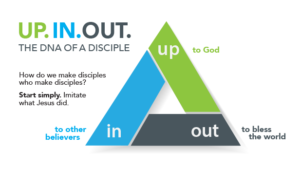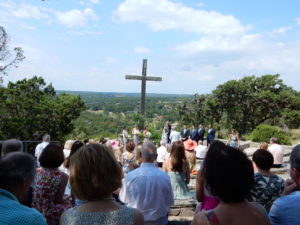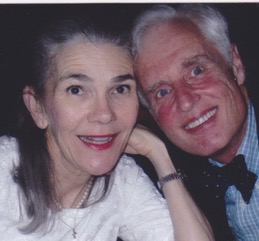The ending of Jonah is mysterious. The story of Jonah begins with a reluctant prophet fleeing from God to avoid going to Nineveh, the capital of the Assyrian empire. He gets thrown overboard in a great storm, eventually ending up in the belly of a huge fish (Jonah 1). God hears Jonah’s prayers and delivers him from the belly of the whale (Jonah 2) Once delivered, Jonah obeys God and goes to Nineveh, the capital of a fierce enemy of Israel. He prophesies to the Ninevites and is successful. The Ninevites, including their king, repent and God withholds judgement (Jonah 3). You would think Jonah would be ecstatic at his unexpected success. Instead, as we will see, Jonah is depressed and angry at God because God has delivered his enemies from wrath and judgement.
Jonah is not much different from us. There are people in this world we really aren’t very interested in seeing experience the love and mercy of God. There are people in this world that we would be just as happy not to be with in the kingdom of God. Perhaps in our day the equivalent of the Ninevites would be ISIS terrorists in the Middle East . It’s helpful, therefore, to remember that God loves everyoneand desires that all people be saved (I Timothy 2:4). God wants his kingdom of wisdom and love to be shared by everyone. This may not be possible, but the heart of God is a heart of love for all people. This is why an often favorite Bible verse is John 3:16:“For God so loved the world that he gave his Only Begotten Son that whosoever believeth in him shall not perish but have eternal life.”
In this meditation, we are going to center our meditation on our calling to bear with one another in love and reach out in love to those whom we do not naturally love.
Learning to Love the Unlovely
Let’s reflect on God as he speaks to us at the end of the story of the Prophet Jonah:
When God saw what they did, how they turned from their evil way, God relented of the disaster that he had said he would do to them, and he did not do it.But it displeased Jonah exceedingly, and he was angry. And he prayed to the Lord and said, “O Lord, is not this what I said when I was yet in my country? That is why I made haste to flee to Tarshish; for I knew that you are a gracious God and merciful, slow to anger and abounding in steadfast love, and relenting from disaster. Therefore now, O Lord, please take my life from me, for it is better for me to die than to live.” And the Lord said, “Do you do well to be angry?”Jonah went out of the city and sat to the east of the city and made a booth for himself there. He sat under it in the shade, till he should see what would become of the city. Now the Lord God appointed a plant and made it come up over Jonah, that it might be a shade over his head, to save him from his discomfort. So, Jonah was exceedingly glad because of the plant. But when dawn came up the next day, God appointed a worm that attacked the plant, so that it withered. When the sun rose, God appointed a scorching east wind, and the sun beat down on the head of Jonah so that he was faint. And he asked that he might die and said, “It is better for me to die than to live.” But God said to Jonah, “Do you do well to be angry for the plant?” And he said, “Yes, I do well to be angry, angry enough to die.” And the Lord said, “You pity the plant, for which you did not labor, nor did you make it grow, which came into being in a night and perished in a night. And should not I pity Nineveh, that great city, in which there are more than 120,000 persons who do not know their right hand from their left, and also much cattle?”(Jonah 1:10-2:11, ESV).
Prayer:God of Mercy and Love: We come to you this morning anxious to be remade into your image—to become little Jesus’ for our families, church, community, and world. We confess to you that we do not always reflect your love and mercy in the way we relate to others. Forgive us. Come in this hour of worship and make us new by your Spirit. Amen.
God is Different
Over the past few weeks we’ve learned that Jonah was a reluctant prophet. When God asked him to go to Nineveh, the capital of the Assyrian nation, he fled west towards Spain.  The Assyrians were fierce enemies of Israel. Just as today Israel shares a border with Syria, in Jonah’s day, Israel shared a border with Assyria. In Jonah’s day, Israel was relatively strong—it had extended its influence north towards Damascus. Nevertheless, Israel feared the Assyrians. The Assyrian military were brutal and heartless. They were more than capable of utterly destroying their enemies. When they finally defeated Israel, they deported a good number of the lost tribes of Israel and brought in other nations to create the land that in Jesus’s day was called “Samaria.” Based on this, we might conclude that Jonah did not want to go to Nineveh solely because he hated the Assyrians.
The Assyrians were fierce enemies of Israel. Just as today Israel shares a border with Syria, in Jonah’s day, Israel shared a border with Assyria. In Jonah’s day, Israel was relatively strong—it had extended its influence north towards Damascus. Nevertheless, Israel feared the Assyrians. The Assyrian military were brutal and heartless. They were more than capable of utterly destroying their enemies. When they finally defeated Israel, they deported a good number of the lost tribes of Israel and brought in other nations to create the land that in Jesus’s day was called “Samaria.” Based on this, we might conclude that Jonah did not want to go to Nineveh solely because he hated the Assyrians.
In today’s text, however, we learn that the basic, underlying reason that Jonah did not want to go to Nineveh was because Jonah feared that God would relent and show mercy on the Assyrians! That is why he tells God, “O Lord, is not this what I said when I was yet in my country? That is why I made haste to flee to Tarshish; for I knew that you are a gracious God and merciful, slow to anger and abounding in steadfast love, and relenting from disaster” (Jonah 4:2).
This is important! Jonah didn’t want to go to Nineveh because he feared that God would actually look with mercy upon the Assyrian people. Jonah knew from his study of the Law, the Prophets and the Writings of his people that God was full of grace, merciful towards enemies, slow to anger, and overflowing with unflinching and unfailing love even for God’s enemies!
In other words, Jonah knew that God is different. God does not take sides in our human conflicts. He sends the rain upon the good and the wicked alike (Matthew 5:45). He provides for all people. He lifts up nations from obscurity and casts nations down into defeat (Isaiah 44). [1] We cannot understand God if we desire God to be guarantor of our personal, tribal or national preferences.
God Wants Us to be Different
In the Old Testament, God told his people that he wanted them to be holy as he is holy (Leviticus 11:44; 11:45; 19:2; 20:7; Isaiah 35:58). In the New Testament, Peter repeats this call to the church: “Be Holy because I am holy”(I Peter 1:16). The Hebrew word for “holy” might be translated “to be different”. [2]God is utterly different from us; and God calls his people to be much different from other people.
What does this difference mean? Well, our text today gives us some clues. God wants us to be gracious not unkind or harsh. God wants us to be merciful towards others not judgmental. God wants us to be slow to anger not temperamental. God wants us to love people sacrificially and not be self-centered. In other words, God wants us to be like Jesus! He calls us to represent his self-giving love and secret wisdom in a broken and often violent world.
In my experience, this is easy to say but hard to live out. The fact is, every day, we have to live in a world that does not necessarily play by God’s laws. In that world, we face pressures to fit in. We face pressures to be like everyone else. It’s not easy to be different. It’s hard! Every so often, we meet someone who we feel is intuitively or naturally Christlike. But if we get to know those people, we learn that it was no easier for them then it is for us.
 One of my favorite stories has to do with Mother Theresa. It is said that once she was with a group of women who were discussing their husbands and how difficult men can be to live with. One of the wives expressed the opinion that Mother Teresa would not know what it was like to have a difficult husband because she was in then. Her response was, “I have a difficult husband, and Jesus is not easy to live with.”
One of my favorite stories has to do with Mother Theresa. It is said that once she was with a group of women who were discussing their husbands and how difficult men can be to live with. One of the wives expressed the opinion that Mother Teresa would not know what it was like to have a difficult husband because she was in then. Her response was, “I have a difficult husband, and Jesus is not easy to live with.”
In 1946 and 1947, Mother Teresa had two years of extraordinary closeness to God. In the end, she heard his call to go among the poorest of the poor. Like Jonah, she did not want to go. But, for the love of Christ, she went. It was not easy. She experienced many years of spiritual struggle. It is not easy holding sick children, lepers, the unclean, and the dying in your arms day in and day out. It is not easy living in constant poverty. But, Mother Teresa was willing to be different for Jesus. [3]
Who Jesus Calls Us to Be
In the Sermon on the Mount, Jesus puts our calling this way:
You have heard that it was said, “You shall love your neighbor and hate your enemy.” But I say to you, Love your enemies and pray for those who persecute you, so that you may be sons of your Father who is in heaven. For he makes his sun rise on the evil and on the good, and sends rain on the just and on the unjust. For if you love those who love you, what reward do you have? Do not even the tax collectors do the same? And if you greet only your brothers, what more are you doing than others? Do not even the Gentiles do the same? You therefore must be perfect, as your heavenly Father is perfect(Matthew 5:43-48).
The perfection of Jesus is the perfection of the mercy, grace and self-giving love of God.
We Can Be Involved
Bay Presbyterian Church is a member of the Evangelical Presbyterian Church. Long ago, the EPC made the decision to center its mission efforts on the Muslim world and on the least reached people of the world. Our missionaries go to some of the most difficult mission fields on the globe.  In some cases, as with the case of Andrew Brunson for whom we have been praying, our missionaries are in physical danger because of the ministry for Christ they have undertaken. We can’t thank them or support them enough.
In some cases, as with the case of Andrew Brunson for whom we have been praying, our missionaries are in physical danger because of the ministry for Christ they have undertaken. We can’t thank them or support them enough.
Over the past several weeks, I’ve been talking with Greg Kopan, one of the elders at Bay Presbyterian Church, about a people group called the “Uyghurs.” This people group is located in western China. The Chinese government fears this group because of a few terrorist related incidents. Because the Uyghurs are predominantly Muslim, and not Han Chinese, this people group is often persecuted by the Chinese people. The Uyghursare suffering and need to experience love and peaceful wisdom of God. [4]The Kopan’s felt called by God to go and to minister to this group of people. We need to thank them.
There may also be people closer to home that we don’t feel terribly comfortable ministering to. There are people in various parts of Cleveland or San Antonio, Texas that I fear and with whom I don’t necessarily want to have personal contact. It helps to remember that God loves these people and wants us to reach out to them. God wants us to be his instruments not just for the salvation of people we like and to whom we can relate, but for the salvation of those who are our enemies or to who we cannot relate as well.
Hanging Around with Jesus
The Pharisees, the Sadducees, the Teachers of the Law often complained about Jesus and about his habit of hanging out with the unclean, the impure, the unlovely, and the sinful. Jesus’ response was that he didn’t come to minister to those who already knew God and were mature in their faith, but to those who needed his spiritual healing to become citizens of the Kingdom of God and members of God’s family (Mark 2:6).
The church in America is dying. We are following the example and course of the church in Europe, which saw a devastating decline after the Second World War. Thus far, most churches have been unable and unwilling to make the adjustments necessary to minister in a post-Christian world, filled with people who did not grow up in the church and have no memories of being a part of the family of God. Frankly, when we divert ourselves from the task of reaching the lost in order to be more comfortable in our building, in our worship service, in our small group, in our Sunday school class, or whatever, we do the Kingdom of God and our King a great disservice. We are reluctant prophets just like Jonah. I’ve mentioned this before during my stay with you, but it’s important for all of us to remember that the church does not exist for us, but we exist for Christ and his church.
Amen
Copyright 2018, G. Christopher Scruggs, All Rights Reserved
[1]The story of the Old Testament reflects the constant rise and fall of various empires. Under the leadership of David Israel became a great nation. It broke apart into two kingdoms. First the Northern Kingdom was defeated by Assyria. Then, the Babylonians defeated Assyria. The Southern Kingdom (Judah) was defeated by the Babylonians. The Medes and the Persians then defeated the Babylonians. The Greeks supplanted the Persians, and Rome supplanted Greece (Daniel). The mere fact of being God’s chosen people was not a barrier to the flow of history in Biblical times, nor in ours.
[2]The Hebrew word, means utterly separate or unlike. God is holy, utterly different that his creation and human beings. We hear his image, but he is utterly different and above us.
[3]David Van Biema, “Mother Teresa’ Crisis of Faith” Time Magazine(August 23, 2007) at http://time.com/4126238/mother-teresas-crisis-of-faith/(Downloaded May 31, 2018). See also, Tom Hoopes, “Mother Teresa’s Marriage Advice” at Gregorian Institute (August 30, 2016) at https://www.thegregorian.org/2016/mother-teresas-wedding-advice(Downloaded May 31, 2018). After much looking, I could not find the original source of the quote about marriage to the Lord.
[4]See, Daniel Byler, “Love and Fear among Rural Uyghur Youth During the People’s War” (December 5, 2017) https://livingotherwise.com/2017/12/05/love-fear-among-rural-uyghur-youth-peoples-war/(Downloaded June 1, 2018); Life Inside China’s Total Surveillance State” Wall Street Journal Online (December 19, 2017) https://www.wsj.com/video/life-inside-chinas-total-surveillance-state/CE86DA19-D55D-4F12-AC6A-3B2A573492CF.html; Stephen Jiang, “Thousands of Uyghur Muslims Detained in Chinese ‘Political Education’ Camps” CNN Online https://www.cnn.com/2018/02/02/asia/china-xinjiang-detention-camps-intl/ (February 2, 2018, downloaded June 2, 2018).




















































